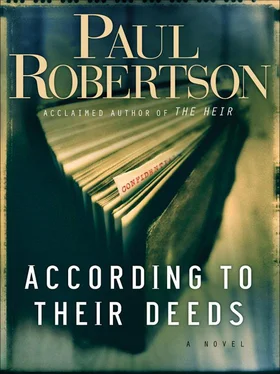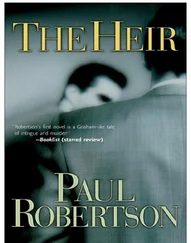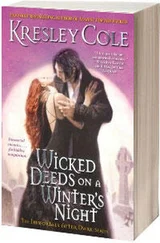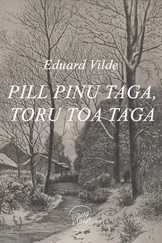Paul Robertson - According to Their Deeds
Здесь есть возможность читать онлайн «Paul Robertson - According to Their Deeds» весь текст электронной книги совершенно бесплатно (целиком полную версию без сокращений). В некоторых случаях можно слушать аудио, скачать через торрент в формате fb2 и присутствует краткое содержание. Жанр: Криминальный детектив, на английском языке. Описание произведения, (предисловие) а так же отзывы посетителей доступны на портале библиотеки ЛибКат.
- Название:According to Their Deeds
- Автор:
- Жанр:
- Год:неизвестен
- ISBN:нет данных
- Рейтинг книги:4 / 5. Голосов: 1
-
Избранное:Добавить в избранное
- Отзывы:
-
Ваша оценка:
- 80
- 1
- 2
- 3
- 4
- 5
According to Their Deeds: краткое содержание, описание и аннотация
Предлагаем к чтению аннотацию, описание, краткое содержание или предисловие (зависит от того, что написал сам автор книги «According to Their Deeds»). Если вы не нашли необходимую информацию о книге — напишите в комментариях, мы постараемся отыскать её.
According to Their Deeds — читать онлайн бесплатно полную книгу (весь текст) целиком
Ниже представлен текст книги, разбитый по страницам. Система сохранения места последней прочитанной страницы, позволяет с удобством читать онлайн бесплатно книгу «According to Their Deeds», без необходимости каждый раз заново искать на чём Вы остановились. Поставьте закладку, и сможете в любой момент перейти на страницу, на которой закончили чтение.
Интервал:
Закладка:
“And the captions are from Proverbs. I’d like to loan it to you. Would you mind?”
“You’d just let me take it?”
“I’d be honored if you would. This is how cultured ladies of a former time dealt with their stress.”
“I could use less stress and more culture.” She lingered over the page for a moment. “I’ll be very careful with it.”
“That’s fine. That’s all it needs.”
The telephone rang, and Dorothy picked it up. “Alexandria Rare Books.” She listened. “No, we close at two on Saturday,” she said. “But we’re open until seven through the week.”
“And it’s noon now,” the congresswoman said. “I am so glad I came. And I know I will enjoy this book. When should I get it back to you?”
“Just when you’ve had time to look through it.”
“I’ll keep it for a few days and send it back. Thank you for our talk.” She opened the door. “We might want to talk again.”
“Whenever you’d like,” he said.
And finally, she was gone.
“What do you think?” Charles asked.
“I’m impressed. She’s a very strong personality.”
“Is she authentic? Sincere?”
“I think so. A force for good.”
“Corrupt?”
“I don’t think so.”
“What would happen if that paper became public?”
“I hope it doesn’t.”
“Does she think I know about her past misdeeds?”
“I think she wonders, Charles. You led her right up to that conversation.”
“She was there waiting for me.”
“Do you think you’ll see her again?”
“That’s up to her. We’ll see if she returns the book herself or just sends it back, like she said.”
EVENING
Charles waited.
He was in the front room of his house, in his comfortable chair. The clock on the mantel chimed six times.
He was in a gray suit, with a flamboyant red tie. Just waiting.
Then a door closed above and there was a rustle on the stairs. He jumped to his feet to watch.
Down she came! All in pale blue, like a quiet sapphire. Closer-and he got very close-the dress was damask textured; elegant from a distance, but intimately intricate. Her face was an exquisite cameo in a silver setting.
“You look so wonderful,” he said.
“And you are quite debonair.”
“We are made for each other.”
“I told Wilhelmina we’d be there in fifteen minutes.”
“You gather the mice, and I’ll bring the pumpkin around.”
“And now, ladies and gentlemen.” The voice flowed like quiet thunder across the ballroom. “It is my pleasure to present to you our director, Mrs. Elizabeth Roper.” Applause echoed back from the forty banquet tables.
“Thank you.” The woman was tall and thin, and her silver dress matched her silver hair. “Thank you.” The applause waned politely. “Before I begin my remarks this evening, I would like to introduce the board of directors of the FitzRobert Foundation. Our chairman, Mr. Thomas Grenville, of McMurty, Grenville and Cole. Stand up, Tom.”
More applause. “Mr. Hamilton Kite of Alexandria Federal Bank. The honorable Mrs. Wilhelmina Stratton. Mrs. Dorothy Beale.”
Dorothy stood, as the others had, but far more splendidly.
“Our special thanks to Wilhelmina and Dorothy for all their work on our banquet this year. And Dorothy dear, just keep standing. This marks the twentieth year Dorothy has been on our board.” Much more applause. “I can’t even begin to tell how much she has done for the Foundation in all those years.
“And of course, she is herself a graduate of the FitzRobert Home.”
She sat, and Charles found her hand and held it while the rest of the names were called, and while the remarks began and plodded their slow path.
“With our new wing, which has now been open for three years, we have one hundred and forty children in the Home. As you see in your annual reports, there are still many needs that have arisen from our expansion. We will be presenting plans this evening for our new dining commons and kitchen. We also have many successes to share with you. And a special surprise.”
A treasurer’s report followed, and then an architect’s presentation, all of it just short of being overlong. The director reclaimed the podium.
“Next is our surprise! Usually at this point in the evening we have a video presentation and we invite several of our older students to tell you how much they appreciate the support we receive from our donors. Tonight we have something different.
“This past year we have increased the faculty of our school by several instructors, especially in our arts and music department. The results have been extraordinary! And now for you, our donors and supporters, we will unveil our most closely held secret. For their inaugural concert, please allow me to introduce the FitzRobert Singers.”
A door opened in a far corner of the ballroom. A small head appeared. It was nearly hidden between the tables, but its progress toward the front was obvious from the audience craning to see. It was followed by more small heads, and then heads with shoulders, and then tall, straight young men and women; they were all in white and black, shirts and blouses, pants and skirts, and they came and came, a dozen and another dozen and another, and then another.
When the final teen had taken her place, the whole array of them was spread across the front stage, forty-eight strong, each as dignified as his or her stature allowed.
An austere young woman, not apparently much older than her oldest students, severely in black including her long, very straight hair, stepped to the podium and turned it to face the faces.
She quietly hummed a pitch, but the whole room heard it. The silence was absolute and fiercely expectant.
She raised her hand. She waved it in four slow beats, and then the downbeat.
“Amazing grace…”
A single child’s voice split the stratosphere, as thin and wafting as air but as piercing as a sword.
“how sweet the sound…”
The others joined him in harmony from the octaves below, their voices clean-scrubbed and as pure delight to hear as they were to see. Verse after verse the music poured, flawless to the last and to the music director’s obvious relief.
The applause was thunderous.
Mrs. Elizabeth Roper, Director of the FitzRobert Home and Foundation, wasted not a moment afterwards.
“As you all know,” she said, “our Foundation relies entirely on our donors. It costs one thousand dollars per month for each child, to provide food, clothing, a bed, and a quality education. We have always provided our services at no cost to our children, who of course, as orphans, do not have families to provide for them. Inside your annual reports, in the back cover, you will find an envelope for your donation this evening. After you’ve put your donation in and filled out the information on the front, the children will be coming to your tables to collect them.”
As the words went on, Charles took a check from his wallet, already made out, and put it in the envelope. On the front of the envelope he filled in his name and checked the box for one time gift and wrote in the amount of the check, $12,000. Then he added, William Beale Memorial Annual Scholarship.
“What are you thinking?” he asked as they drove the dark streets back home.
“I know how those children felt,” she said. “I was one of them there tonight.”
“Do you remember the banquets they had when you lived there?”
“I think they had just a few donors, and they were very rich. They gave them tours. We would be so dressed up! They’d come walking through and we had to be just perfect. I didn’t understand what it meant, just that they were so important and we should be so very grateful. It was frightening. I was sure I would do something wrong and these people would have me thrown out, or the whole Home would be shut down and it would be my fault.”
Читать дальшеИнтервал:
Закладка:
Похожие книги на «According to Their Deeds»
Представляем Вашему вниманию похожие книги на «According to Their Deeds» списком для выбора. Мы отобрали схожую по названию и смыслу литературу в надежде предоставить читателям больше вариантов отыскать новые, интересные, ещё непрочитанные произведения.
Обсуждение, отзывы о книге «According to Their Deeds» и просто собственные мнения читателей. Оставьте ваши комментарии, напишите, что Вы думаете о произведении, его смысле или главных героях. Укажите что конкретно понравилось, а что нет, и почему Вы так считаете.











